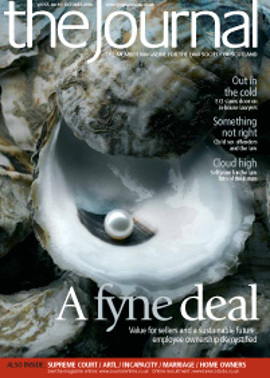No discrimination?
Sport in Scotland is no different to any other aspect of society and life in being subject to Scots law.
But the regulation and administration of sport is heavily influenced not only in turn by EU law, but by developments and practice found in jurisdictions throughout the world, as international federations cascade regulatory and administrative requirements down through continental federations and on to national governing bodies, and through the practice of multiple jurisdiction appeal and arbitration mechanisms.
An interesting if not worrying development for amateur sport is a recent German case in which EU law was applied to a dispute concerning domestic amateur sport.
The seminal case of Bosman (Case C-415/93) made clear that EC law applied to professional sport. As a result, recent attempts to limit participation in professional sport on the basis of nationality have been struck at as constituting direct discrimination expressly prohibited by EU law. With the European Commission firmly against any such attempts to regulate participation, notwithstanding the aim to retain national identity in sport and promote opportunities for nationals to participate within their state, sports bodies have had to try to promote these ideals with other methods.
One example is UEFA’s “home-grown player” rules (which focus on where a player trained as a youth, as opposed to nationality), the Commission considering any indirectly discriminatory effects of such rules being capable of justification as a proportionate means of achieving a legitimate aim.
While Bosman confirmed that sport is subject to Community law insofar as it constitutes an economic activity, what has been less than clear is the application of EU law to amateur sport. Meca-Medina (Case C-519/04 P, judgment of 18 July 2006) suggested that pure sports rules, not capable of challenge under EU law, would be hard to find, and a recent opinion of the Commission and a decision from the German Basketball Federation’s Legal Committee suggest that amateur sport should not consider itself outwith EU law merely by being a predominantly “non-economic” activity.
Vital link?
The “WBV” is the regional basketball federation for Western Germany. In June 2009, new rules were introduced limiting teams to playing two non-national players per game. The rules were challenged as breaching the non-discrimination and freedom of movement provisions in articles 12, 17 and 39 EC (now articles 18, 20 and 45). The WBV’s disputes are heard at regional and then national level; at both levels the WBV contention that amateur sports did not constitute an “economic activity” and therefore could not be subject to EU law was rejected.
The (independent) national legal committee considered that, since the Treaty of Amsterdam (1999), Community law has provided certain “civil” rights for EU citizens that do not require a link to any economic activity. Article 12 EC, which prohibits discrimination on the ground of nationality, is one of these rights. The committee went on to note that article 12 applies not only to emanations of the state, but also to private federations or organisations to the extent that they are capable of undermining the EU anti-discrimination provisions as a result of their autonomy.
The committee commented that, when sports federations occupy a monopoly position, they have legislative powers in their field which are comparable to those of the state. Accordingly, it was comfortable that article 12 EC is enforceable against both professional and amateur sporting bodies in certain circumstances. The WBV occupied such a monopoly position as, in order to participate, all members were required to comply with its rules. Accordingly, the legal committee took the view that the WBV rules were subject to article 12 EC.
This view relied in particular on the European Commission’s recent opinion (1 February 2010) on the applicability of EU law to amateur sports, in which it noted that: “following a combined reading of articles 18, 21 and 165 of the Treaty of the Functioning of the European Union [articles 12, 18 and 149 of the EC Treaty respectively]…, the general EU principle of prohibition of discrimination on grounds of nationality applies to sport for all EU citizens who have used their right to free movement. This principle concerns amateur sport as well as professional sport, which falls more specifically under the provisions related to internal market freedoms, such as Article 45 TFEU on free movement of workers or Article 56 TFEU on freedom to provide services, in so far as the considered sport activities constitute an economic activity” (emphasis added).
Impact of the decision
Challenges to sporting decisions are becoming more frequent and complex, and as a result there has been a trend found in recent decisions in sports such as rugby and snooker where decision makers have encouraged a less legalistic approach to be taken. While such recommendations are laudable, the likelihood is that amateur sport faces the prospect of more scrutiny and complex legal challenges.
Bruce Caldow, Partner, Harper Macleod LLP
With thanks to Dr Martin Schimke LLM and Catriona Borland, Bird & Bird LLP, Düsseldorf.
In this issue
- The Scottish Government's EU and International Law Branch
- Akzo-Nobel: what you need to know
- The Edinburgh Declaration
- The curtailment of criminal appeals to London
- Society, justice and the greater good
- "We've aye done it this way" – not now!
- A deal to buy in to
- Land Register: what next?
- Designed to appeal
- Perpetrator or victim?
- An orchestra of instruments
- Two by two, by two
- Added capacity
- D-Day for legal aid
- Law reform update
- Compliance and the consent regime
- From the Brussels office
- Paper, pixel and process
- Ask Ash
- Draft proof
- Time for a fresh look
- Where to draw the line
- Reviewing the review law
- Expensive business
- Taking the full impact
- No discrimination?
- Scottish Solicitors' Discipline Tribunal
- Website review
- Book reviews
- It's not good to talk
- Getting to know you






